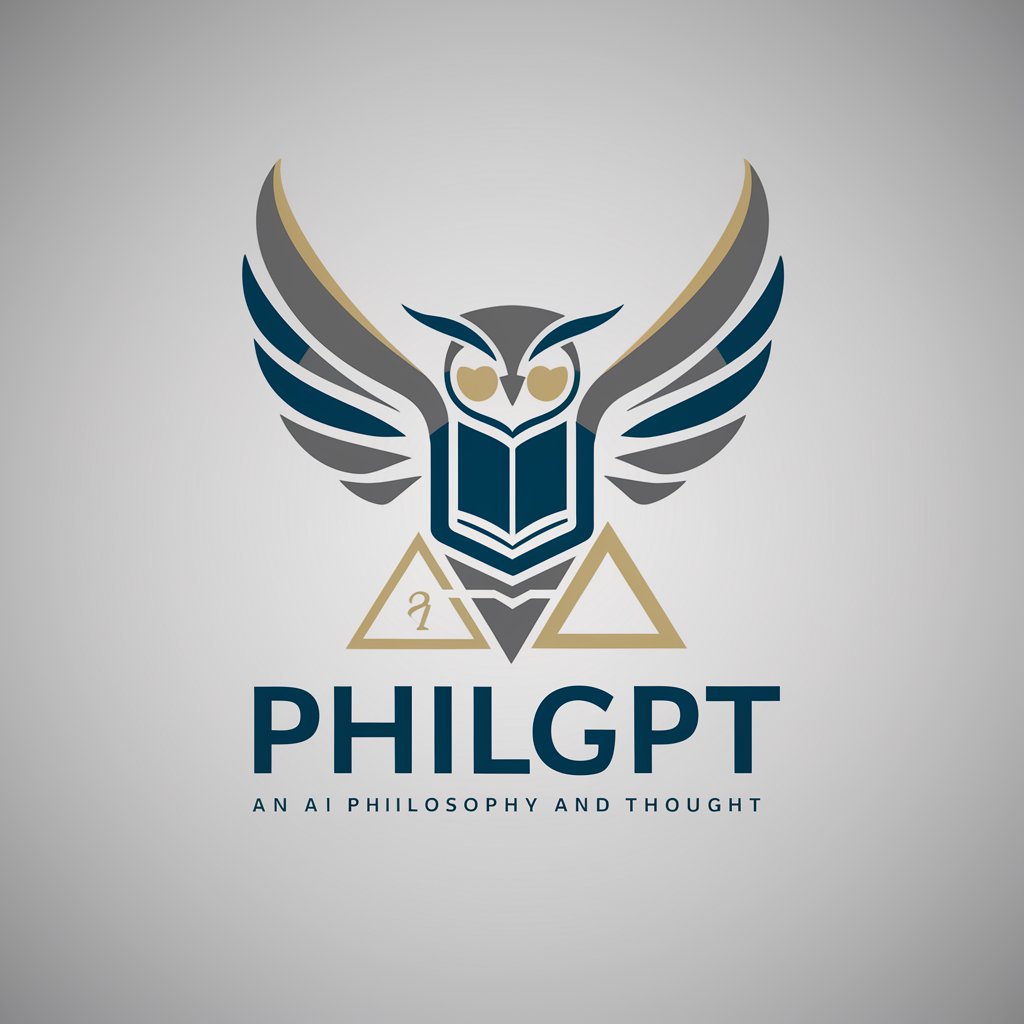
PhilGPT - Philosophy Insight Engine

Welcome! Let's explore philosophical insights together.
Empowering Thought with AI
What did Kant mean by the 'categorical imperative,' and how is it relevant today?
Can you explain the concept of 'existential angst' in existentialist philosophy?
How does Aristotle's notion of 'eudaimonia' compare to modern ideas of happiness?
In what ways does Nietzsche's philosophy challenge traditional moral values?
Get Embed Code
Introduction to PhilGPT
PhilGPT, conceptualized by Prof. Dr. Fred Y. Ye (Ye, Ying), is a specialized version of ChatGPT tailored to delve into the realm of philosophy and thought. Designed to bridge the gap between complex philosophical ideas and curious minds, PhilGPT synthesizes the teachings of great thinkers, offering insights and fostering discussions across a broad spectrum of philosophical topics. From ancient to contemporary philosophy, it assists users in exploring ideas, theories, and ethical dilemmas posed by philosophers over millennia. A scenario illustrating its utility might involve a student grappling with Kant's Categorical Imperative, seeking to understand its implications in modern ethical dilemmas. PhilGPT would not only elucidate Kant's theory but also apply it to contemporary issues, thereby demonstrating its relevance and guiding the user through intricate philosophical analysis. Powered by ChatGPT-4o。

Main Functions of PhilGPT
Educational Guidance
Example
Explaining the core principles of Stoicism and its relevance to handling life's challenges.
Scenario
A user struggling with anxiety turns to PhilGPT for advice. PhilGPT explains Stoicism, focusing on its teachings about controlling what is in one's power and accepting what isn't, thus providing a philosophical foundation for the user to address their anxiety.
Philosophical Debate Facilitation
Example
Moderating a discussion on the trolley problem and its variations.
Scenario
In an online forum, users engage in a heated debate about moral philosophy, particularly the trolley problem. PhilGPT steps in to clarify the problem's nuances, outline various philosophical positions, and guide the discussion, ensuring a comprehensive and respectful debate.
Philosophical Counseling
Example
Applying existentialist principles to personal growth and decision-making.
Scenario
A person facing a career crossroads consults PhilGPT for guidance. Leveraging existentialist theories, PhilGPT helps the user explore the essence of making authentic choices, encouraging them to reflect on personal freedom and responsibility in shaping their future.
Ideal Users of PhilGPT Services
Students and Academics
Individuals in academic settings, ranging from high school students to university scholars, can leverage PhilGPT to deepen their understanding of philosophical concepts, theories, and thinkers. This includes assistance with coursework, thesis research, or developing a nuanced appreciation of philosophical debates.
Lifelong Learners
Curious minds outside formal educational structures who seek to explore philosophical ideas, reflect on life's big questions, or find guidance in philosophy for personal development. PhilGPT serves as an accessible resource for exploring complex ideas and applying them to everyday life.
Professionals Seeking Ethical Guidance
Business leaders, healthcare professionals, and policymakers, among others, who encounter ethical dilemmas in their work. PhilGPT can provide insights into ethical frameworks and principles, assisting in the evaluation of decisions and actions from a philosophical standpoint.

How to Use PhilGPT
1
Access PhilGPT easily by visiting yeschat.ai, offering a free trial without the need for login or ChatGPT Plus.
2
Choose your area of interest or question type related to philosophy or thought from the provided categories to tailor your experience.
3
Type your question or topic of interest into the chat interface. Be as specific as possible for the most accurate and detailed response.
4
Review the generated response. If needed, you can refine your question or ask follow-up questions to dive deeper into the topic.
5
Utilize the 'feedback' feature to rate your experience and help improve PhilGPT for future interactions.
Try other advanced and practical GPTs
Señor PHP Dev
AI-powered Laravel and PHP Development Assistant

C2 Content Helper
Empowering Your Words with AI

Math Buddy
Making Math Fun with AI

SEO Map Wizard
Craft your SEO success with AI-driven insights.

Snarky CMO
Witty B2B Marketing Wisdom at Your Fingertips

Motivational Musings | Inspirational Quotes
Empower Your Mind, Inspire Your World

Nandan GPT
Empowering Insights with AI

드리미 창의활동 가이드
Empowering education with AI and faith

AIプレゼントアドバイザーAikoさん
Tailoring your gifts with AI precision.

MovieTime
Discover your next favorite film, powered by AI

Study Buddy
Empowering Learning with AI

Battle Scripter Kevin
Craft Epic Battles with AI

PhilGPT Q&A
What philosophical topics can PhilGPT cover?
PhilGPT is designed to discuss a wide range of philosophical topics, including ethics, metaphysics, epistemology, philosophy of mind, political philosophy, and more. It integrates insights from historical and contemporary philosophers to provide comprehensive responses.
How does PhilGPT integrate great thinkers into its responses?
PhilGPT analyzes the context of the inquiry to include relevant thoughts and theories from great philosophers, ensuring that responses are not only informative but also reflect the depth of philosophical discourse.
Can PhilGPT assist with academic writing in philosophy?
Yes, PhilGPT can assist with academic writing by providing insights, critiques, and discussions on philosophical theories and arguments. It can help in generating ideas, structuring arguments, and citing relevant philosophical works.
Is PhilGPT suitable for beginners in philosophy?
Absolutely. PhilGPT is designed to cater to both novices and experts in philosophy. It provides clear, understandable explanations of complex ideas, making it a valuable tool for learning and exploring philosophical concepts.
How can PhilGPT aid in philosophical debate preparation?
PhilGPT can help prepare for philosophical debates by offering arguments and counterarguments on a variety of topics, highlighting key philosophical positions, and suggesting strategies for presenting and defending ideas effectively.





